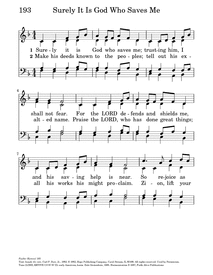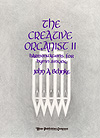- |
User Links
Surely It Is God Who Saves Me

Surely it is God who saves me; Trusting him, I shall not fear
Author: Carl P. DawONE LICENSE: 03994
Published in 14 hymnals
Printable scores: MusicXMLAudio files: MIDI
Representative Text
Author: Carl P. Daw
Carl P. Daw, Jr. (b. Louisville, KY, 1944) is the son of a Baptist minister. He holds a PhD degree in English (University of Virginia) and taught English from 1970-1979 at the College of William and Mary, Williamsburg, Virginia. As an Episcopal priest (MDiv, 1981, University of the South, Sewanee, Tennesee) he served several congregations in Virginia, Connecticut and Pennsylvania. From 1996-2009 he served as the Executive Director of The Hymn Society in the United States and Canada. Carl Daw began to write hymns as a consultant member of the Text committee for The Hymnal 1982, and his many texts often appeared first in several small collections, including A Year of Grace: Hymns for the Church Year (1990); To Sing God’s Praise (1992), New… Go to person page >Text Information
| First Line: | Surely it is God who saves me; Trusting him, I shall not fear |
| Title: | Surely It Is God Who Saves Me |
| Author: | Carl P. Daw |
| Meter: | 8.7.8.7 D |
| Source: | The First Song of Isaiah (para.) |
| Language: | English |
| Copyright: | © 1982, Hope Publishing Company |
Notes
Scripture References:
st. 1 = Isa. 12:2-4a
st. 2 = Isa. 12:4b-6
Isaiah 12 consists of two stanzas of praise (12: 1-3 and 4-6). Together they make up the "First Song of Isaiah," one of the "lesser" Old Testament canticles used by the medieval church. As songs of joy and praise for God's deliverance, these stanzas are the climax to a group of prophecies spanning Isaiah 7-11. In stanza 1, Isaiah 12:2 echoes Exodus 15:2 of the Song of Moses (see also 152), and 12:3 uses the "wells of living water" image, often a biblical symbol of salvation (John 4:10). Stanza 2 reflects the praise language that abounds in the book of Psalms. Carl P. Daw, Jr. (b. Louisville, KY, 1944), versified these passages in 1981 for The Hymnal 1982, the Episcopal Church hymnal published in 1985.
Daw was born into a Baptist preacher's family. He received degrees in English from Rice University and the University of Virginia (Ph.D. in 1970), and taught English at the College of William and Mary, Williamsburg, Virginia (1970-1978). In 1981 he received a divinity degree from the University of the South, Sewanee, Tennessee. After ordination in the Protestant Episcopal Church, he served Episcopal congregations in Virginia, Connecticut, and Pennsylvania. In 1996 he was appointed executive director of the Hymn Society in the United States and Canada. Daw is a widely respected and often published author of numerous hymns and hymn articles. His texts were collected in A Year of Grace (1990), To Sing God's Praise (1992), and New Psalms and Hymns and Spiritual Songs (1996).
Liturgical Use:
Daw suggests this song is suitable for baptism and as a general hymn of assurance; stanza 2 has a mission theme and may also reinforce Advent or Christmas themes, mentioning God's incarnation; Isaiah 12 is also one of the canticles appointed for daily morning prayer in various Christian prayer books.
--Psalter Hymnal Handbook, 1988
Timeline
Arrangements
Media
Psalter Hymnal (Gray) #193
- Full Score (XML)


 My Starred Hymns
My Starred Hymns




